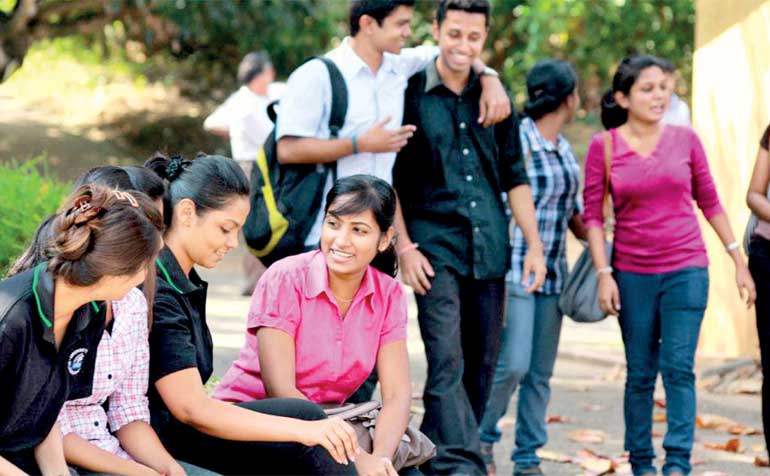Monday Feb 23, 2026
Monday Feb 23, 2026
Tuesday, 9 February 2016 00:01 - - {{hitsCtrl.values.hits}}
Sri Lanka’s grey-haired rulers have promised to architect a new constitution for the Republic. What is in it for us, young people? What are our priorities? While there may be things that we’re divided on amongst ourselves, are there a few things we could advocate for, together?
How can we ensure that this isn’t a process dominated by the old and that the youth aren’t ‘engaged’ in a show of tokenism – to give the bulath atha (betel leaves sheaf) and to hang garlands around necks of our veteran politicians in whose mighty hands the ultimate discretion over decision-making lies?
 Let’s hope that the young people of this country can play a meaningful role in the making of the Constitution
Let’s hope that the young people of this country can play a meaningful role in the making of the Constitution
Will this process be as impenetrable and exclusive (as most processes in this country happen to be) at the end of which the politicians would hand us down a constitution which they’ve written for us, without us?
The last time the politicians of this country wrote a constitution in 1978 (and the time before that in 1972, as well) they got more than a few things extremely wrong and it was the young people in the succeeding generations that bore the ugly repercussions of those actions. We have a right to be engaged, and our rulers have an obligation to include us.
The Sri Lankan state has often had a very paternalistic and welfarist attitude towards young people. Young people are often viewed as passive recipients of benefits and services provided to them by the state as opposed to vehicles of change that could drive their communities along progress and development.
Most policies and laws in Sri Lanka that deal with young people perpetuate this kind of thinking. This is partly because a lot of the policies that are in place are ones that were developed following the youth insurrections in the 1970s and ’80s that tried to topple the existing system of government and establish a new one.
As such, young people are often seen as angry, radical and too idealistic and as a group that should be pacified by giving carrots. Phrases being used to describe young people such as ‘tharuna asahanaya’ (the restlessness of youth?) mirror this kind of thinking.
In the following recommendations I deliberately chose not to deal with some of the bigger questions that we have debated on, as a country over the years. We have debated on issues such as the reform of the executive and the electoral system for decades now. However, there are other, perhaps equally important, issues that have rarely come up in the Sri Lankan political discourse – some of which are extremely close to young people.
An Independent Commission on Youth
While there has been some discourse around the creation of independent commissions for women and other groups, little has been discussed on the importance on an Independent Commission on Youth. Such a commission should comprise of young people as  well as older people who can work together on strengthening youth engagement and steering youth empowerment initiatives in Sri Lanka.
well as older people who can work together on strengthening youth engagement and steering youth empowerment initiatives in Sri Lanka.
Important institutions working with and on youth such as the National Youth Services Council, the Sri Lanka Youth Parliament and the Sri Lanka Federation of Youth Clubs could come under the direct control of this commission. These institutions and others have been politicised to a great extent under various governments and often come under the direct control of youth wings of whatever political party is in power at the time. It is our hope that such an independent commission would help depoliticise these institutions.
The Commission could also advise the government on issues affecting young people such youth unemployment, skills development, education and sexual and reproductive health and rights.
Equality for all Sri Lankans as a crosscutting theme
Post-Apartheid South Africa’s Constitution begins with the preamble ‘We, the people of South Africa, recognise the injustices of our past; honour those who suffered for justice and freedom in our land; respect those who have worked to build and develop our country; and believe that South Africa belongs to all who live in it, united in our diversity’.
Furthermore, the provisions under Right to Equality in the recently adopted Nepali constitution state that ‘no discrimination shall be made against any citizen in the application of general laws on grounds of religion, colour, caste, tribe, sex, sexual orientation, bodily condition, disability, status of health, marital status, pregnancy, financial status, origin, language or region or ideological conviction.’ Sri Lanka could draw from both these examples and more to recognise equality as a crosscutting theme for the whole constitution.
It is proposed that the new constitution includes sexual orientation and gender identity as grounds for non-discrimination. All Sri Lankans, young and old should be able to love who they want to love and be comfortable with their bodies and express their gender in the way they feel most comfortable. There are countless stories of bullying, abuse, discrimination and even suicide of Sri Lankans who have diverse sexual orientations and gender identities.
A few days ago, the media reported an incident where the Avissawella Police arrested two young women who were ‘suspected of lesbianism’. The right to privacy must be recognised in the constitution, especially on those matters which are most personal, such as one’s sexuality and identity.
Young transgender Sri Lankans are particularly discriminated especially with regard to obtaining new national identity cards following reassignment surgeries. While many countries in the region including India, Pakistan and Nepal recognise a ‘third gender,’ Sri Lanka lags far behind.
"The last time the politicians of this country wrote a constitution in 1978 (and the time before that in 1972, as well) they got more than a few things extremely wrong and it was the young people in the succeeding generations that bore the ugly repercussions of those actions. We have a right to be engaged, and our rulers have an obligation to include us"
The right to life
The right to life should recognised by the constitution. As such, the death penalty should be abolished through the constitution itself. Nepal, with the adoption of the new constitution recently became the second country in South Asia to abolish the death penalty – a lesson for all of us in the region.
However, the recognition of the right to life shouldn’t be used to bar women who wish to terminate their pregnancies for various reasons. Many of us are aware that illegal abortions take place on a daily basis in this country and the conditions of many of these clinics (due to the lack of a better word) are appalling and extremely harmful for the life and health of the women and girls who access these services.
Education
While Sri Lanka has been rightly recognised globally for its achievements in ensuring access to education, it is clear that Sri Lanka’s education system is facing challenges in adapting to vast transformations taking place around the world and here at home.
Ours is a highly unequal country. One where those at the top use all the skills and advantages they have to remain there. Education should act as a leveller in an unequal society, and not further reinforce existing disparities. However, the structural disparities inbuilt in our education system only perpetuate inequality.
A total of 97% of all state schools in Sri Lanka are administered by provincial councils. The remaining 3% are ‘national schools’ administered by the central government. It is a fact that, while there may be a handful of exceptions, ‘national schools’ have the most qualified teachers and administrators, the best equipped laboratories, libraries and computer labs, swimming pools etc.. In the context of meaningful power-sharing between the state and the provinces, it is proposed that all schools be brought under the control of the provincial councils, as this display of favouritism to a select few schools is extremely unfair.
Technology
According to the latest statistics there are over 2.8 million internet users in Sri Lanka. The Internet should not belong to only 2.8 million Sri Lankans. It should be seen as a necessity for development, a prerequisite to be an engaged citizen in a democracy and a tool that makes larger things possible.
We believe that the constitution should recognise the responsibility of the state to ensure that all people, regardless of where they live or how old they are, what their income is, or what they languages they can or cannot speak, are able to access technology and the internet in particular. India has begun a nationwide program to digitise the country and it’s important that Sri Lanka follows suit.
Climate change
Climate change is possibly the biggest challenge facing us today. As an island nation Sri Lanka is particularly vulnerable, it’s important for the constitution to make addressing climate change a constitutional obligation of the state. Under their new constitution, victims of environmental pollution or degradation in Nepal now have the fundamental right to receive compensation from the polluter.
In addition to these, it’s also important to have special provisions on the rights of women, people with disabilities and indigenous groups. This time around, let’s hope its third time lucky and post-independence Sri Lanka’s third constitution would be one that brings the people of the country together, strengthens democratic institutions and the rule of law and facilitates sustainable and equitable development to all Sri Lankans. Let’s also hope that the young people of this country can play a meaningful role in its making – nothing about us, without us!